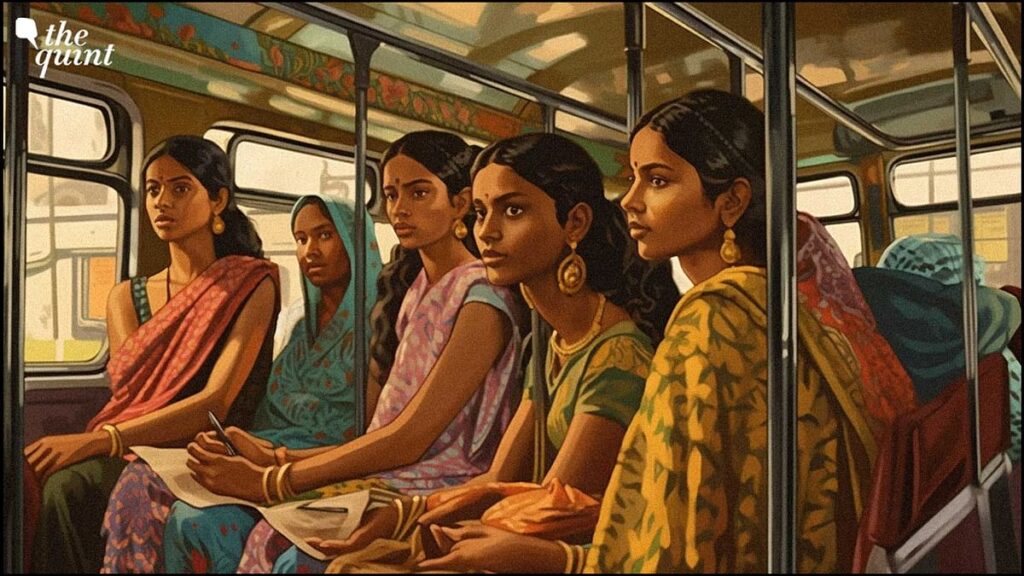It appears that the zero bus fare scheme for women in Karnataka, launched by the newly elected Congress government in the state, has ruffled quite a few feathers on social media.
The Shakti Scheme has been offering women free travel in non-premium services of the state-run Road Transport Corporation (RTC) since 11 June.
With women from all walks of life availing themselves of the scheme, several Twitter users have taken it upon themselves to explain why ‘free bus rides are a waste of taxpayer money’, how ‘freebies ruin the economy’, and why ‘such initiatives should be income-based’.
But is the scheme really a waste of taxpayer money? Is it just a ‘freebie’ or ‘election handout’ aimed to garner women’s votes? Not really, if one realises how important mobility is for women – especially for women from marginalised communities.
Why Is the Scheme Important for Women?
Speaking to The Quint, Tara Krishnaswamy, co-founder of Political Shakti – an organisation that works towards improving the electoral representation of women – contends that free bus travel has the ability to determine women’s education, livelihood, safety, and security.
“In India, women’s mobility has always been restricted as a cultural practice. Even today, in many parts of the country, a woman’s ability to travel alone is in question. Women are often stopped from going to college because they have to travel a long distance. Even if you look at migration patterns, women often migrate because they marry – not because they have a job.”
In such a scenario, free bus rides may enable more women to travel. Moreover, the higher the number of women in public spaces, the safer these spaces will be, she adds.
Vibhuti Patel, an economist, tells The Quint that women’s lack of mobility can also be attributed to the fact that they have very little control over their money.
She further says that this, in turn, keeps them off the workforce, and as a result, stunts economic growth.
“Only 19 percent of women are currently in the workforce, out of which over 92 percent of women are in the informal sector, getting the bare minimum for the survival of their household. They have to walk for miles to get their daily survival needs. So, naturally, they benefit from free transport,” Patel adds.
Free bus rides, therefore, may also result in an economic improvement as many things that women were unable to do, they would be able to do now.
However, Twitter users, especially men, found fault with women who ‘look like they could afford a ticket’ making use of the scheme. Women who posted pictures of themselves in buses were subjected to misogynistic comments and abuse online.
“If the scheme is able to get women who are using private transport – whether it is cars or bikes – off the roads and onto buses, that is a humongous success,” argues Krishnaswamy. “Bengaluru has a congestion problem. We also have a pollution problem. So, this experiment might help prove that if public transport is made available and convenient, the number of private vehicles on roads will reduce. If even well-to-do women are taking the bus, then this is a huge success!”, she added.
The point, Krishnaswamy says, is that “we are not pioneering anything. There are numerous studies across the developed world that show that when public transport is made free, the economy actually improves, in addition to the reduction of traffic congestion and pollution.”
The Shakti Scheme, however, is not without flaws. It can be utilised only by women with proof of domicile. “The problem with Shakti Scheme is not that it is a freebie, but it is going to leave out deserving women who do not have such proofs,” she adds.
The Economics of a ‘Freebie’
Patel tells The Quint she strongly objects to the term ‘freebies’ when it comes to welfare schemes for poor and marginalised people: “Instead of focusing on the unjust and exploitative systems perpetrated by the macroeconomic policies that accentuate socio-economic inequalities, which result in the social exclusion of women from human development, we are categorising a social inclusive measure such as free transport as a ‘freebie’.”
Krishnaswamy concurs, saying: “Such reactions are coming from people who are unable to appreciate why we even have a democracy and governance. From time immemorial, we have had welfare schemes.”
She says that when MG Ramachandran, the former chief minister of Tamil Nadu, universalised the noon meal or midday meal scheme – and offered it to students from all sections of the society – there was a huge hue and cry.
“The media, politicians, and the rest of the country argued that Tamil Nadu should not be feeding everyone in government schools – and that it should only feed people who don’t have the ability to feed themselves,” she says.
But now, the scheme is being emulated across the country – because it contributes to economic growth, she adds.
Citing the example of flyovers in cities, she says: “What is actually a freebie as far as transport is concerned are flyovers. Because to build flyovers, tax money is taken from everyone, including the most marginalised sections. But only car and bike users can largely use it. So, who does it help? Only those who have private transport.”
(The author is senior correspondent at The Quint; and former senior sub-editor, The New Indian Express. Courtesy: The Quint.)




